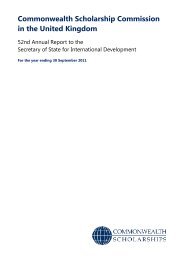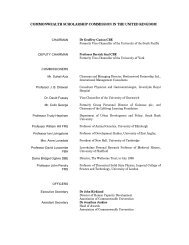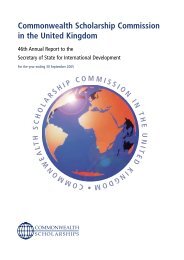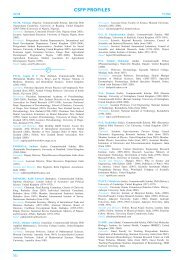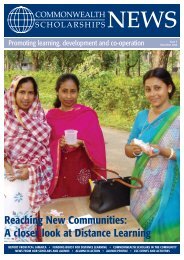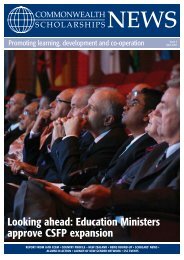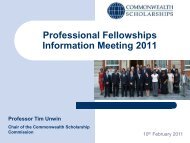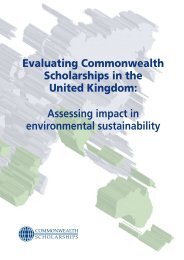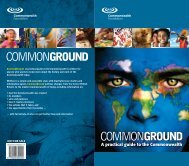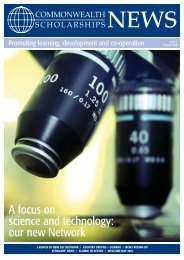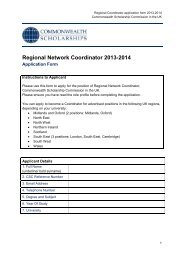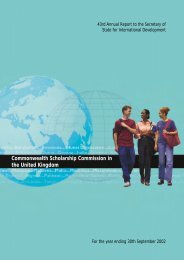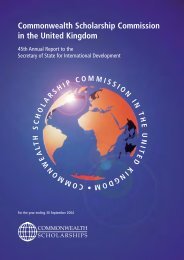Citizenship and the Commonwealth The Active Commonwealth ...
Citizenship and the Commonwealth The Active Commonwealth ...
Citizenship and the Commonwealth The Active Commonwealth ...
Create successful ePaper yourself
Turn your PDF publications into a flip-book with our unique Google optimized e-Paper software.
Report of <strong>the</strong> Inaugural <strong>Commonwealth</strong>Conference:<strong>Citizenship</strong> <strong>and</strong> <strong>the</strong> <strong>Commonwealth</strong><strong>The</strong> <strong>Active</strong> <strong>Commonwealth</strong> Citizen10–12 November 2010Cumberl<strong>and</strong> Lodge, Windsor, UK
IntroductionWhat does citizenship really mean to <strong>the</strong> people of <strong>the</strong> <strong>Commonwealth</strong>?It is possible to take a highly pessimistic view of <strong>the</strong> present, seeing agradual breakdown around <strong>the</strong> world of ‘traditional’ bonds of loyalty<strong>and</strong> community, which leaves people disengaged <strong>and</strong> isolated. Many areunknown, unvalued <strong>and</strong> at odds with societies of which <strong>the</strong>y do not feel apart. Rampant commercialisation has left companies unaccountable to <strong>the</strong>communities in which <strong>the</strong>y operate <strong>and</strong> has made money <strong>the</strong> only measureof value.Yet it is also possible to identify cause for optimism. People are comingtoge<strong>the</strong>r in new ways <strong>and</strong> dem<strong>and</strong>ing more of governments <strong>and</strong> globalinstitutions than ever before. <strong>The</strong>y are dem<strong>and</strong>ing to know <strong>the</strong> reasonswhy decisions were made, <strong>and</strong> <strong>the</strong>y are dem<strong>and</strong>ing access to informationso <strong>the</strong>y can make informed decisions of <strong>the</strong>ir own. People <strong>and</strong> communitiesare asserting <strong>the</strong>ir right to be consulted <strong>and</strong> to have a say in decisions, aswell as insisting that <strong>the</strong>y must be involved in <strong>the</strong> delivery of projects <strong>and</strong>services if solutions are to be sustainable, understood <strong>and</strong> owned.<strong>The</strong> <strong>Commonwealth</strong>’s vision is one of values ― it is a voluntary associationdedicated to advancing democracy, human rights, <strong>the</strong> rule of law, <strong>and</strong>sustainable development. <strong>The</strong> <strong>Commonwealth</strong> is also a community ofcitizens tied toge<strong>the</strong>r through history, language <strong>and</strong>, above all, sharedhope.All citizens have a right to decide <strong>the</strong>ir own future. This right is ofcourse shared outside <strong>the</strong> <strong>Commonwealth</strong>, but <strong>the</strong> <strong>Commonwealth</strong>has incomparable networks to take forward its vision of democracy <strong>and</strong>development, through a genuine <strong>and</strong> equal partnership between people<strong>and</strong> governments.
<strong>Citizenship</strong> in <strong>the</strong> <strong>Commonwealth</strong>Unique in <strong>the</strong> international l<strong>and</strong>scape, <strong>the</strong> <strong>Commonwealth</strong> is <strong>the</strong> onlyassociation where citizen-to-citizen links under <strong>the</strong> auspices of <strong>the</strong>association pre-date <strong>the</strong> creation of formal institutions by membergovernments. Networks for education, language <strong>and</strong> law will be paramountin many people’s minds. For 25 years <strong>the</strong> <strong>Commonwealth</strong> Writers’ Prizehas launched successful careers in fiction; for 50 years <strong>Commonwealth</strong>Scholarships have created leaders in all walks of life; <strong>and</strong> for more than 100years <strong>Commonwealth</strong> parliamentarians have shared experience <strong>and</strong> ideason governance. Professional networks of foresters, engineers, teachers,doctors, nurses, civil servants, local governments, judges, lawyers <strong>and</strong>many, many more, engage with thous<strong>and</strong>s of people every day, meetingvoluntarily <strong>and</strong> building <strong>the</strong> social capital that puts <strong>the</strong> <strong>Commonwealth</strong>’svalues into practice. <strong>The</strong> bonds we have through conflict are rememberedby <strong>the</strong> <strong>Commonwealth</strong> War Graves Commission that manages 23,000locations in 150 countries. And, <strong>the</strong> <strong>Commonwealth</strong> Games reminds us of<strong>the</strong> way in which sport has provided ano<strong>the</strong>r important link. <strong>The</strong>se are <strong>the</strong>citizens’ connections <strong>and</strong> networks that make <strong>the</strong> <strong>Commonwealth</strong> special.Jeffrey Sachs, in his book Common Wealth, says ‘No major problem canbe solved by government, or <strong>the</strong> business sector, or one communityalone. Complex social problems have multiple stakeholders … Gainingcooperation among [<strong>the</strong>m] is <strong>the</strong> toughest challenge of all.’ But <strong>the</strong><strong>Commonwealth</strong> is pre-adapted to succeed in bringing stakeholderstoge<strong>the</strong>r to tackle problems by using its people-to-people links. It is timeto recognise <strong>the</strong> power of this citizen engagement, <strong>and</strong> to re-evaluate <strong>the</strong>significance of <strong>the</strong> professions, cultural organisations, <strong>and</strong> citizens’ groupsin <strong>the</strong> <strong>Commonwealth</strong>. What our citizens need from <strong>the</strong>ir governmentsnow is <strong>the</strong> opportunity to be heard, <strong>and</strong> <strong>the</strong> infrastructure to make <strong>the</strong>separtnerships work. We need to re-assess <strong>the</strong> meaning of citizenship in<strong>the</strong> <strong>Commonwealth</strong> <strong>and</strong> hardwire <strong>the</strong> concept into <strong>the</strong> <strong>Commonwealth</strong>’sfuture.This conference did not produce all <strong>the</strong> answers. <strong>The</strong> debates on citizenshipin <strong>the</strong> <strong>Commonwealth</strong>, <strong>and</strong> <strong>Commonwealth</strong> citizenship, will continue. Butit is hoped that this report will be a launchpad for <strong>the</strong> development of newideas <strong>and</strong> action.*****6
<strong>Citizenship</strong> in <strong>the</strong> <strong>Commonwealth</strong><strong>The</strong> <strong>Commonwealth</strong> Conference is an initiative of <strong>the</strong> <strong>Commonwealth</strong>Foundation <strong>and</strong> <strong>the</strong> Institute of <strong>Commonwealth</strong> Studies, in partnershipwith <strong>the</strong> <strong>Commonwealth</strong> Scholarship Commission. It is hoped that<strong>the</strong> <strong>Commonwealth</strong> Conference will become a regular event, held in asuccession of countries across <strong>the</strong> <strong>Commonwealth</strong>.<strong>The</strong> aim of <strong>the</strong> conferences is to bring toge<strong>the</strong>r academics, students,policy makers, members of NGOs <strong>and</strong> o<strong>the</strong>r civil society groups, to discussan issue of central importance to <strong>the</strong> future of <strong>the</strong> <strong>Commonwealth</strong>.Special emphasis will be placed on engaging with <strong>the</strong> views of students,early-career researchers <strong>and</strong> o<strong>the</strong>r young people from across <strong>the</strong><strong>Commonwealth</strong>.This, <strong>the</strong> first <strong>Commonwealth</strong> Conference, held at Cumberl<strong>and</strong> Lodge,Windsor in <strong>the</strong> UK in November 2010, explored what it means to be acitizen of <strong>the</strong> <strong>Commonwealth</strong> in <strong>the</strong> 21st century. <strong>The</strong> issue of citizenshipreceived only passing mention in <strong>the</strong> Communiqué of <strong>the</strong> 2009 CHOGM.Yet <strong>the</strong> creation of effective forms of citizenship, which offer <strong>the</strong> maximumpotential for <strong>the</strong> inhabitants of <strong>Commonwealth</strong> countries to play an active<strong>and</strong> informed role in shaping <strong>the</strong>ir lives <strong>and</strong> <strong>the</strong>ir countries is an importantprecondition for <strong>the</strong> achievement of <strong>the</strong> <strong>Commonwealth</strong>’s stated goalsin areas as diverse as democratisation, sustainable development, humanrights, combating corruption <strong>and</strong> tackling climate change.This Report will be presented to <strong>the</strong> <strong>Commonwealth</strong> People’s Forum (CPF)― <strong>the</strong> civil society ga<strong>the</strong>ring that takes place ahead of each <strong>Commonwealth</strong>summit, held every two years. <strong>The</strong> CPF will issue a statement to heads ofgovernment. It is hoped that <strong>the</strong> recommendations of this report will becaptured in <strong>the</strong> CPF statement <strong>and</strong> that civil society representatives press<strong>Commonwealth</strong> leaders <strong>and</strong> foreign ministers to adopt <strong>and</strong> advance <strong>the</strong>seideas when <strong>the</strong>y meet at <strong>the</strong> next <strong>Commonwealth</strong> Heads of GovernmentMeeting (CHOGM) in October 2011 in Perth, Australia.*****<strong>The</strong> <strong>Commonwealth</strong> Foundation is an intergovernmental organisationset up in 1965 to make civil society stronger. It empowers charities, nongovernmentalorganisations, professional associations, trade unions, faithgroups <strong>and</strong> cultural practitioners ― <strong>the</strong> lifeblood of any healthy society.<strong>The</strong> Foundation equips <strong>the</strong>se groups with <strong>the</strong> tools required to contribute7
<strong>Citizenship</strong> in <strong>the</strong> <strong>Commonwealth</strong>to national <strong>and</strong> international goals of democracy, good governance,sustainable development <strong>and</strong> cultural diversity. <strong>The</strong> Foundation rewardsexcellence in <strong>the</strong> arts <strong>and</strong> helps to influence key policy-makers. It alsochampions, develops <strong>and</strong> invests in activities that enrich <strong>and</strong> streng<strong>the</strong>nsociety. It acts as a vital resource for <strong>Commonwealth</strong> people, enabling<strong>the</strong>m to raise <strong>the</strong>ir voice, instigate change, <strong>and</strong> fashion a better world.<strong>The</strong> Institute of <strong>Commonwealth</strong> Studies, founded in 1949, is <strong>the</strong> onlypostgraduate academic institution in <strong>the</strong> United Kingdom devoted to<strong>the</strong> study of <strong>the</strong> <strong>Commonwealth</strong>. It is also home to <strong>the</strong> longest-runninginterdisciplinary <strong>and</strong> practice-oriented human rights MA programme in <strong>the</strong>UK. <strong>The</strong> Institute is a national <strong>and</strong> international centre of excellence forpolicy-relevant research, research facilitation <strong>and</strong> teaching. As a member of<strong>the</strong> School of Advanced Study, established in 1994, <strong>the</strong> Institute works withnine o<strong>the</strong>r prestigious postgraduate research institutes to offer academicopportunities across <strong>and</strong> between a wide range of subject fields in <strong>the</strong>humanities <strong>and</strong> social sciences. <strong>The</strong> Institute’s library is an internationalresource holding more than 190,000 volumes, with particularly impressiveCaribbean, Sou<strong>the</strong>rn African <strong>and</strong> Australian holdings <strong>and</strong> over 200 archivalcollections.<strong>The</strong> <strong>Commonwealth</strong> Scholarship Commission in <strong>the</strong> United Kingdom (CSC)is responsible for managing Britain’s contribution to <strong>the</strong> <strong>Commonwealth</strong>Scholarship <strong>and</strong> Fellowship Plan (CSFP), established in 1959. <strong>The</strong> CSCsupports around 700 awards annually. Awards are funded by <strong>the</strong>Department for International Development (for developing <strong>Commonwealth</strong>countries), <strong>and</strong> <strong>the</strong> Foreign <strong>and</strong> <strong>Commonwealth</strong> Office, <strong>the</strong> Department forBusiness, Innovation <strong>and</strong> Skills <strong>and</strong> <strong>the</strong> Scottish Government (for developed<strong>Commonwealth</strong> countries), in conjunction with UK universities. <strong>The</strong> CSCmakes available seven types of awards, <strong>and</strong> also nominates UK citizens forscholarships to study in o<strong>the</strong>r <strong>Commonwealth</strong> countries under <strong>the</strong> CSFP.This report was written by Daisy Cooper based on <strong>the</strong> presentations givenby <strong>the</strong> conference speakers.8
Chapter 1: What is citizenship?(Speaker: Sharon Zivkovic, University of South Australia)<strong>The</strong>re is no universally accepted definition of <strong>the</strong> term ‘citizenship’. In <strong>the</strong>most limited sense, it is about an individual’s membership of a state or apolitical community that gives rise to legal <strong>and</strong> moral rights <strong>and</strong> duties. But<strong>the</strong> concept has evolved <strong>and</strong> it is now so widely accepted that it includesnot merely membership of a state but also membership of <strong>the</strong> globalpolitical community.<strong>The</strong>re are many reasons for governments to engage stakeholders: it canhelp <strong>the</strong>m to underst<strong>and</strong> <strong>the</strong> complexity <strong>and</strong> interconnectedness ofproblems; it can help <strong>the</strong>m identify possible solutions; <strong>and</strong> it can helpensure that any required changes are understood, discussed <strong>and</strong> owned by<strong>the</strong> people to whom <strong>the</strong>se changes apply.<strong>The</strong> idea of ‘<strong>Active</strong> <strong>Citizenship</strong>’ is derived predominantly from <strong>the</strong> fieldof education. Some <strong>the</strong>ories emphasise learning through volunteering<strong>and</strong> community service, whilst o<strong>the</strong>rs emphasise learning through civicengagement <strong>and</strong> non-formal political participation. Essentially, <strong>the</strong> notionof active citizenship involves both decision making <strong>and</strong> community action― citizens should be supported to engage in deliberating about <strong>the</strong> world,to develop policies with governments, <strong>and</strong> to take collective action tochange <strong>the</strong> world.Research shows that people feel motivated to participate when <strong>the</strong>ybelieve <strong>the</strong>y can influence decisions <strong>and</strong> make an impact on society.<strong>Citizenship</strong> education programmes <strong>the</strong>refore need to equip citizens with<strong>the</strong> knowledge, skills <strong>and</strong> attributes to enable <strong>the</strong>m to make a differenceto <strong>the</strong> world around <strong>the</strong>m ― whe<strong>the</strong>r at <strong>the</strong> local, national, or global level,or in making connections between levels. <strong>Active</strong> citizens need <strong>the</strong> skillsto access information <strong>the</strong>mselves, a desire to build <strong>the</strong> capacity of <strong>the</strong>ircommunities, <strong>the</strong> ability to consider issues from a variety of perspectives9
<strong>Citizenship</strong> in <strong>the</strong> <strong>Commonwealth</strong><strong>and</strong> <strong>the</strong> skills to initiate collective action with diverse stakeholders includinggovernments.<strong>The</strong> positive impact of suchcitizenship education programmesis clear. Recurrent findings fromresearch to determine <strong>the</strong> impactof <strong>the</strong> Community CapacityBuilders active citizenshipprogramme in <strong>the</strong> City ofEffective states requireeffective citizensOnkaparinga, South Australia (www.onkaparingacity.com/onka/living_here/community/leadership_onkaparinga.jsp) show that such programmesincrease <strong>the</strong> political effectiveness of people, <strong>and</strong> create additionalbenefits:• programme participants consider <strong>the</strong>y are more confident in <strong>the</strong>irability to shape <strong>the</strong>ir lives <strong>and</strong> <strong>the</strong>ir communities• <strong>the</strong>y feel more confident to seek out <strong>and</strong> use information• <strong>the</strong>y have more confidence in political institutions• <strong>the</strong>y feel more able to engage in democratic processes <strong>and</strong> support <strong>the</strong>work of government• <strong>the</strong>y are eager to pass on <strong>the</strong> knowledge <strong>and</strong> skills <strong>the</strong>y have gained too<strong>the</strong>rs in <strong>the</strong>ir communitiesEffective states require effective citizens <strong>and</strong> <strong>the</strong> <strong>Commonwealth</strong> needsto help create conditions for active citizenship within its countries <strong>and</strong>institutions.In 2005, 2,300 people took part in agreeing <strong>the</strong> United Nations BrisbaneDeclaration of Community Engagement. With <strong>the</strong> 2011 CHOGM takingplace in Perth, <strong>the</strong>re is an opportunity for <strong>Commonwealth</strong> governments<strong>and</strong> institutions to commit <strong>the</strong>mselves to a programme of active citizenshipengagement <strong>and</strong> education.<strong>The</strong> British Council’s ‘<strong>Active</strong> Citizens’ programme: a case study<strong>The</strong> purpose of <strong>the</strong> ‘<strong>Active</strong> Citizens’ programme is to increase <strong>the</strong>contribution of those adults who have a social network within <strong>the</strong>ir localcommunities. <strong>The</strong> programme aims to help people become active locally,to equip <strong>the</strong>m with <strong>the</strong> skills <strong>and</strong> confidence to engage in decision-makingprocess, <strong>and</strong> to talk about citizenship across cultures.10
<strong>Citizenship</strong> in <strong>the</strong> <strong>Commonwealth</strong>In order to achieve its goals, <strong>the</strong> <strong>Active</strong> Citizens programme is dividedinto three phases: local training, social action projects, <strong>and</strong> internationalengagement. This is broken down into a six-stage journey experienced overone week:• Identity – explore <strong>the</strong> concept of ‘me’• Culture – knowing ourselves <strong>and</strong> our community• Dialogue – listening without assumptions; transmitting informationabout me to o<strong>the</strong>rs• Society <strong>and</strong> citizenship – learning about culture <strong>and</strong> decision-making• Project planning <strong>and</strong> social action – developing an active communityproject• International inter-cultural dialogue – through exchange trips or onlineNext generation reports: Pakistani youth speak out on TVA group of young people voiced <strong>the</strong>ir opinions about weighty topical issueshighlighted in <strong>the</strong> <strong>Active</strong> Citizens report, Pakistan: <strong>The</strong> Next Generation(available at www.britishcouncil.pk/pakistan-Next-Generation-Report.pdf),on <strong>the</strong> national TV programme ‘Dunya Today’. <strong>The</strong> programme focused on<strong>the</strong> issue of corruption in government, which <strong>the</strong> report revealed to beof great concern to young people for <strong>the</strong> future security of <strong>the</strong>ir country.<strong>The</strong> programme, which draws around 20 million viewers, was aired in aprimetime slot on 9 November 2010 <strong>and</strong> was <strong>the</strong> first of a four-part seriesof seminars involving <strong>Active</strong> Citizens <strong>and</strong> <strong>the</strong> Young Parliamentarians’Forum (YPF).Wales – Kenya community development exchangeIn March 2010, a group of young Welsh community leaders went to Kenya<strong>and</strong> Sudan <strong>and</strong> worked with Sudanese <strong>and</strong> Kenyan community leaders togain an international perspective on positive social action <strong>and</strong> communitydevelopment. In May, eight community leaders from Kenya journeyedto Wales where <strong>the</strong>y carried out similar activities with communitydevelopment project leaders. For instance, <strong>the</strong>y met with <strong>the</strong> WelshAssembly Government <strong>and</strong> witnessed how Welsh communities engageyouth from deprived areas of Wales. <strong>The</strong>y also visited Cardiff City FootballClub, which runs community-orientated <strong>and</strong> youth-focused schemes thathave since inspired <strong>the</strong> Kenyan <strong>Active</strong> Citizens to develop an under-14schampionship back home in Diani (see http://activecitizens.britishcouncil.org/content/wales-kenya-exchange)11
<strong>Citizenship</strong> in <strong>the</strong> <strong>Commonwealth</strong>Kenyan <strong>and</strong> Welsh ‘<strong>Active</strong> Citizens’ at <strong>the</strong> meeting with <strong>the</strong> Lord Mayor of Cardiff, ProfessorDelme Bowen. Mansion House, official residence of <strong>the</strong> Lord Mayor of Cardiff, June 2011.Photo courtesy of <strong>the</strong> British Council.Challenging illiteracy in BangladeshYoung people in Baniazurivillage in Manikganj knew thatilliteracy was a major concernin <strong>the</strong>ir community. Following<strong>the</strong> completion of leadershiptraining under <strong>the</strong> <strong>Active</strong> Citizensprogramme, <strong>the</strong>y decided to makepositive changes by setting up aCitizens have a right toask why things are notgetting doneliteracy centre for adults in <strong>the</strong>ir community. This will help 300 peopleovercome illiteracy. With <strong>the</strong> support of <strong>the</strong> elders of <strong>the</strong> community,<strong>the</strong> young participants decided not only to help educate people but alsospread awareness on good health practices such as drinking safe water <strong>and</strong>washing h<strong>and</strong>s. <strong>The</strong> centre will operate in shifts <strong>and</strong> a total of seven youngpeople will teach at <strong>the</strong> centre voluntarily (see www.britishcouncil.org/bangladesh-active-citizen.htm).12
Chapter 2: Citizens <strong>and</strong> <strong>the</strong>ir rightsCitizens’ rights in <strong>the</strong> 21st century: a case study of <strong>the</strong> 2007 JamaicanGeneral Election (Speaker: Am<strong>and</strong>a Sives, University of Liverpool)<strong>The</strong> results of <strong>the</strong> 2007 Jamaican general election were extremely closewith less than two per cent of <strong>the</strong> vote, just four seats, separating <strong>the</strong>two main parties. Having lost <strong>the</strong> election, <strong>the</strong> opposition party sought tochallenge <strong>the</strong> result by exposing <strong>the</strong> fact that four of <strong>the</strong> winning party’sc<strong>and</strong>idates had dual citizenship, three jointly with <strong>the</strong> USA. <strong>The</strong> oppositionparty claimed that <strong>the</strong>se c<strong>and</strong>idates, by virtue of having sworn allegianceto foreign countries, were in breach of constitutional provisions. This <strong>the</strong>nprompted a national debate about who should be entitled to vote <strong>and</strong>st<strong>and</strong> for election in Jamaica, particularly as those rights related to dualcitizenship <strong>and</strong> <strong>Commonwealth</strong> citizenship.At <strong>the</strong> time of Independence, <strong>the</strong> Jamaican Constitution extended <strong>the</strong> rightto vote in Jamaica to two types of citizens:<strong>and</strong>,a citizen of Jamaica resident in Jamaica at <strong>the</strong> date of registrationa <strong>Commonwealth</strong> citizen who is resident in Jamaica at <strong>the</strong> date ofregistration <strong>and</strong> who has been so resident for at least 12 monthsimmediately preceding that date <strong>and</strong> has attained <strong>the</strong> prescribedage.<strong>The</strong> right to be elected in Jamaica was articulated as:A person will be qualified for appointment to <strong>the</strong> Senate or forelection to <strong>the</strong> House of Representatives if he [sic] is a citizen ofJamaica or o<strong>the</strong>r <strong>Commonwealth</strong> country of <strong>the</strong> age of 21 or more15
<strong>Citizenship</strong> in <strong>the</strong> <strong>Commonwealth</strong><strong>and</strong> has been ordinarily resident in Jamaica for <strong>the</strong> immediatelypreceding 12 months.<strong>The</strong> problem was that four of <strong>the</strong> elected JLP MPs were technicallyin breach of <strong>the</strong> constitutional provision which disallows ‘anyacknowledgement of allegiance, obedience or adherence to a foreignPower or State’.In June 2008, <strong>the</strong> Prime Minister of Jamaica, Bruce Golding MP, speaking ata Jamaica diaspora conference, described <strong>the</strong> situation as a ‘constitutionalabsurdity.’ He said,<strong>The</strong>y may have been born in Australia, New Zeal<strong>and</strong>, Canada, youname it … <strong>and</strong> once <strong>the</strong>y have lived in Jamaica for one year can<strong>the</strong>n become a Member of Parliament. I have a difficulty if that kindof person can sit with me in Parliament, but a Jamaican who born<strong>and</strong> grow part of <strong>the</strong> time here <strong>and</strong> do [sic] <strong>the</strong> rest of <strong>the</strong> growingsomewhere else cannot sit with me in Parliament.That same month, <strong>the</strong> leader of <strong>the</strong> opposition, Portia Simpson-Miller,said that <strong>the</strong> constitution should be amended to preclude <strong>Commonwealth</strong>citizens from holding political office in Jamaica.<strong>The</strong> situation whereby<strong>Commonwealth</strong> citizens have<strong>the</strong> right to vote or become amember of parliament in ano<strong>the</strong>r<strong>Commonwealth</strong> country is ahistorical anomaly. In fact, <strong>the</strong>reare only 13 <strong>Commonwealth</strong>countries which provide voterrights for <strong>Commonwealth</strong> citizens,<strong>and</strong> <strong>the</strong>re are only eight whichprovide c<strong>and</strong>idate rights for<strong>Commonwealth</strong> citizens. Moreover,of <strong>the</strong> 13, all are in <strong>the</strong> Caribbeanexcept for <strong>the</strong> UK <strong>and</strong> Mauritius.Bruce Golding<strong>The</strong> right of <strong>Commonwealth</strong>citizens to vote <strong>and</strong> be16
<strong>Citizenship</strong> in <strong>the</strong> <strong>Commonwealth</strong>representatives in a small numberof countries is a historical anomaly<strong>and</strong> should be questioned. In <strong>the</strong>modern <strong>Commonwealth</strong>, citizenshipneeds to be redefined as a processof empowering individuals acrossa range of countries to dem<strong>and</strong><strong>the</strong>ir rights from governments <strong>and</strong>from <strong>the</strong> wider <strong>Commonwealth</strong>institutions. We need a shared<strong>and</strong> agreed underst<strong>and</strong>ing ofwhat is meant by <strong>Commonwealth</strong>citizenship in <strong>the</strong> 21st century.That <strong>Commonwealth</strong>citizens can vote orbe an MP in ano<strong>the</strong>r<strong>Commonwealth</strong>country, is a historicalanomaly<strong>Citizenship</strong>, passports, <strong>and</strong> rights: ECOWAS community citizenshipin perspective (Speaker: Edefe Ojomo, former research fellow at <strong>the</strong>ECOWAS Commission, Nigeria)In 2000, West African countries adopted a policy for a borderless EconomicCommunity of West African States (ECOWAS). Countries agreed to abolish<strong>the</strong> requirement that citizens needed a passport or a residence permitto travel between or reside within ECOWAS countries. In ‘<strong>the</strong> spirit ofequal treatment of Community citizens’ <strong>the</strong> ECOWAS community adopted<strong>and</strong> introduced a single ECOWAS passport, giving political identity to allECOWAS citizens. <strong>The</strong>ir entitlements include <strong>the</strong> right of entry, <strong>the</strong> right ofresidence <strong>and</strong> <strong>the</strong> right of establishment.Previously, in <strong>the</strong> 1979 Protocol Relating to Free Movement of Persons,Residence <strong>and</strong> Establishment, a ‘citizen of <strong>the</strong> Community’ was definedas meaning a ‘citizen of any Member State.’ A subsequent 1982 Protocoladopted for <strong>the</strong> purpose defines a community citizen based on ‘nationality’<strong>and</strong> ties to a member state. Citizens of <strong>the</strong> ECOWAS community <strong>the</strong>reforeonly have this regional political status, by virtue of <strong>the</strong>ir nationalcitizenship. Indeed, this point is central to <strong>the</strong> debate on whe<strong>the</strong>r <strong>the</strong>concept of ‘<strong>Commonwealth</strong> citizenship’ can be defined, or has any realmeaning. In a strictly political definition, ‘<strong>Commonwealth</strong> citizens’ can onlyhave this status by virtue of <strong>the</strong>ir citizenship of a <strong>Commonwealth</strong> membercountry.17
<strong>Citizenship</strong> in <strong>the</strong> <strong>Commonwealth</strong><strong>The</strong> political reality of this definition <strong>the</strong>n is that citizenship impliesexclusion for lots of people. In keeping with <strong>the</strong> <strong>Commonwealth</strong>’sprinciples, <strong>the</strong> concept of <strong>Commonwealth</strong> citizenship should try to beinclusive, whe<strong>the</strong>r by encouraging active <strong>Commonwealth</strong> citizens to be anexample to o<strong>the</strong>rs, or by exporting ideas to <strong>the</strong> world.Most of <strong>the</strong> populations of ECOWAS countries live in rural communitiesgoverned by social patterns. For many, ‘<strong>the</strong> state’ exists only in <strong>the</strong> capital.With over 200 ethnic groups in ECOWAS, people’s sense of identity <strong>and</strong>belonging is stronger within <strong>the</strong>ir local community, than with <strong>the</strong> state <strong>and</strong>region.Most of <strong>the</strong> <strong>Commonwealth</strong>’spopulation lives in rural communitiestoo ― <strong>the</strong> <strong>Commonwealth</strong> needsto get to know <strong>the</strong>se citizens. If<strong>Commonwealth</strong> citizenship is tomean anything, <strong>the</strong> <strong>Commonwealth</strong>must define <strong>the</strong> rights <strong>and</strong> duties of<strong>Commonwealth</strong> citizens to each o<strong>the</strong>r,<strong>and</strong> it must define <strong>the</strong> duties <strong>and</strong>responsibilities of <strong>Commonwealth</strong>institutions to <strong>Commonwealth</strong> citizens.Most of <strong>the</strong><strong>Commonwealth</strong>’spopulation lives inrural communities ―<strong>the</strong> <strong>Commonwealth</strong>needs to get to know<strong>the</strong>se citizens18
Chapter 3: Teaching citizenship<strong>Citizenship</strong> education in English-speaking primary schools in Cameroon,for children aged 5–12 (Speaker: Charles Tante, University of Buea,Cameroon)Cameroon’s two official languages are French <strong>and</strong> English: <strong>the</strong> legacy of itsdivision into British <strong>and</strong> French-governed territories at <strong>the</strong> end of <strong>the</strong> FirstWorld War. Following unification at independence, Cameroon struggledto harmonise its educational system. In 1998, a law was passed thatestablished two subsystems: English-speaking <strong>and</strong> French-speaking.<strong>The</strong> first national syllabus for Cameroon’s English-speaking sub-systemwas issued in <strong>the</strong> year 2000, 40 years after independence. One of itsinnovations was a shift in <strong>the</strong> content of <strong>the</strong> curriculum. <strong>The</strong> three Rsof ‘reading, writing <strong>and</strong> arithmetic’ were replaced with a much broadercurriculum, which included citizenship education.Today, <strong>the</strong> citizenship curriculum involves three subjects: civics education,human rights education <strong>and</strong> moral education. <strong>The</strong> course emphasises <strong>the</strong>skills <strong>and</strong> attitudes <strong>the</strong> nation-state would like its primary school pupils todevelop. <strong>The</strong>se relate to regional, national <strong>and</strong> global levels. Indeed, <strong>the</strong>influence of globalisation <strong>and</strong> <strong>the</strong> importance of being a ‘global citizen’ areevident in <strong>the</strong> preamble to <strong>the</strong> syllabus which states that,... <strong>the</strong> primary school curriculum in Cameroon should not only focuson <strong>the</strong> traditional school subjects but must include global concernssuch as human rights, environmental education, democracy, peaceeducation, civil defence, moral education <strong>and</strong> HIV/AIDS.<strong>The</strong> syllabus is based around objectives, topic <strong>and</strong> content. Importantly, <strong>the</strong>syllabus is drawn firstly to emphasise <strong>the</strong> type of young learner <strong>the</strong> nation-19
<strong>Citizenship</strong> in <strong>the</strong> <strong>Commonwealth</strong>state encourages, before setting out <strong>the</strong> content by which learners willbecome responsible in aspects of citizenship education at <strong>the</strong>ir level.<strong>Citizenship</strong> education is taught in all sixyears of primary school. Of <strong>the</strong> threesubjects, civics education is <strong>the</strong> mostelaborate tier catering separately for eachof <strong>the</strong> six year classes. From Class One toClass Four <strong>the</strong> content revolves around<strong>the</strong> relationship between <strong>the</strong> individual,home, school, <strong>the</strong> administrative context<strong>and</strong> <strong>the</strong> broader society. Direct mention<strong>The</strong> syllabusemphasises <strong>the</strong>type of younglearner <strong>the</strong> nationstateencouragesis made of <strong>the</strong> <strong>Commonwealth</strong> in Class Five (<strong>the</strong>re is fur<strong>the</strong>r developmentof this in post-primary school). Classes Five <strong>and</strong> Six emphasise some of<strong>the</strong> ills in society such as gambling <strong>and</strong> bribery <strong>and</strong> teach children about<strong>the</strong>ir duties to <strong>the</strong> home, as well as developing <strong>the</strong>ir knowledge aboutlocal, provincial, national world issues such as types of councils, <strong>the</strong>various arms of government, international organisations <strong>and</strong> <strong>the</strong>ir relationwith Cameroon. O<strong>the</strong>r areas covered include: <strong>the</strong> constitution; duties ofmembers of government; use of <strong>the</strong> highway; types of elections; <strong>and</strong> rights<strong>and</strong> obligations of self <strong>and</strong> o<strong>the</strong>rs.It has been hard to judge <strong>the</strong> effectiveness or impact of teachingcitizenship. Whilst <strong>the</strong> nation-state of Cameroon is trying to encourage <strong>the</strong>English-speaking ‘Young Learner’ to develop a sense of <strong>the</strong> local, regional,national <strong>and</strong> global belonging, this is undermined by <strong>the</strong>ir experiencesoutside <strong>the</strong> classroom. Seeing corruption <strong>and</strong> bribery in <strong>the</strong>ir societymay confuse <strong>the</strong> young learners, robbing <strong>the</strong>m of any trust in <strong>the</strong> idea ofcitizenship <strong>and</strong> leading <strong>the</strong>m to perceive it merely as a subject in which tosucceed at school.Corruption <strong>and</strong> briberymay cause younglearners to lose trust in<strong>the</strong> idea of citizenship<strong>Citizenship</strong> must not just be aschool subject ― people musttranslate <strong>the</strong>ory into practice, in<strong>the</strong>ir professional, personal <strong>and</strong>political lives. Moreover, effectivecitizenship education must encouragecollaboration between <strong>the</strong> state,schools, parents, local community<strong>and</strong> peers.20
<strong>Citizenship</strong> in <strong>the</strong> <strong>Commonwealth</strong>Rum, curry <strong>and</strong> cricket ― multiculturalism <strong>and</strong> multi-nationalism in <strong>the</strong><strong>Commonwealth</strong> Caribbean (Speaker: Kris Rampersad)Rum, curry <strong>and</strong> cricket are symbols of <strong>the</strong> multinational nature of<strong>the</strong> <strong>Commonwealth</strong> Caribbean <strong>and</strong> are all products of <strong>the</strong> process ofcolonialism <strong>and</strong> globalisation that developed into <strong>the</strong> <strong>Commonwealth</strong> ofnations.<strong>The</strong> process of building a sense ofidentity as a global citizen did notbegin in <strong>the</strong> 1970s as is being toutedin much international discourse; thatprocess has been unfolding in <strong>the</strong>former colonies of <strong>the</strong> British, French<strong>and</strong> Dutch in <strong>the</strong> Caribbean since<strong>Commonwealth</strong>citizens should nurturetransnational solidarityto fight justice issues<strong>the</strong> initial encounter between <strong>the</strong> old worlds <strong>and</strong> <strong>the</strong> new one. Researchevidence from early English newspapers in Trinidad <strong>and</strong> Tobago reveals <strong>the</strong>colonies engaged in interrogating <strong>and</strong> pronouncing upon <strong>the</strong> multinationalnature of <strong>the</strong>ir specific reality as well as <strong>the</strong> world. Kris Rampersad’s book,Finding a Place, documented that process <strong>and</strong> provided evidence thatshows, in relation to transplanted people from India to <strong>the</strong> Caribbeanthrough British colonialism, that <strong>the</strong>re was no conceptual conflict betweenbeing a citizen under foreign rule of both <strong>the</strong> new world <strong>and</strong> <strong>the</strong> old at<strong>the</strong> same time. People accepted <strong>the</strong>ir multinational character <strong>and</strong> weretrying to find ways of having this accommodated within <strong>the</strong> political <strong>and</strong>social structures. And so, more than 200 years ago, Trinidad <strong>and</strong> Tobagobecame a microcosm of <strong>the</strong> process of globalisation, since <strong>the</strong> isl<strong>and</strong>shad already been populated by indigenous groups first from Europe, <strong>the</strong>nfrom Africa followed by Asia (Indians, Chinese). As early as this, evenbefore aeroplanes, mass communication <strong>and</strong> <strong>the</strong> internet, mo<strong>the</strong>rl<strong>and</strong> <strong>and</strong>home could be several places at <strong>the</strong> same time. <strong>The</strong>re was no conflict, forinstance, in <strong>the</strong> idea of being simultaneously a son of India, a citizen of <strong>the</strong><strong>Commonwealth</strong>, <strong>and</strong> a Trinidadian. <strong>The</strong> country became an incubator fordiversity.In October 2010, German chancellor Angela Merkel claimed that hercountry’s attempts to create a multicultural society had ‘utterly failed’.Since <strong>the</strong> term ‘multicultural’ entered <strong>the</strong> global vocabulary in <strong>the</strong>1970s, UNESCO has introduced a number of awkward culture-basedconventions to protect <strong>and</strong> preserve <strong>the</strong> ‘diversity’ of culture <strong>and</strong> heritage.25
<strong>Citizenship</strong> in <strong>the</strong> <strong>Commonwealth</strong>Multiculturalism is an awkward concept, <strong>and</strong> difficult to define. <strong>The</strong> idea ofglobal citizenship is more meaningful.Ra<strong>the</strong>r than leading <strong>the</strong> way, <strong>the</strong> <strong>Commonwealth</strong>’s response has beenlargely reactive. Increasingly, citizens identify with many nationalities ordifferent national experiences. <strong>Citizenship</strong> is changing through informalprocesses, including migration. <strong>The</strong> <strong>Commonwealth</strong> is ideally placed topresent a borderless solution to <strong>the</strong> idea of citizenship. Drawing on <strong>the</strong>irhistorical connections, citizens around <strong>the</strong> <strong>Commonwealth</strong> can nurture <strong>and</strong>build that reality. <strong>The</strong> <strong>Commonwealth</strong> must itself streng<strong>the</strong>n its institutionsto recognise <strong>and</strong> act on that strength, ra<strong>the</strong>r than play at following suitto o<strong>the</strong>r international organisations that are functioning from <strong>the</strong>oreticalas opposed to practical experience of <strong>the</strong> nature of multiculturalism <strong>and</strong>multinationalism.<strong>The</strong> underst<strong>and</strong>ing that citizen power is not soft power would have to beamong <strong>the</strong> most important of those changes.26
Chapter 5: <strong>Citizenship</strong>, reconciliation <strong>and</strong> <strong>the</strong>marginalisedQuest for citizenship ― youth in post-conflict <strong>Commonwealth</strong> societies(Speaker David Mwambari, Syracuse University, NY)As many as 20,000 children have been abducted in <strong>the</strong> last 19 years to fightwars, 12,000 of <strong>the</strong>m between 2002 <strong>and</strong> 2004. By virtue of being coercedinto being political tools to create <strong>and</strong> sustain wars, <strong>the</strong>se individuals areno longer treated as humans or citizens. Regarded as an enemy within<strong>the</strong> country, unwanted by any community, <strong>the</strong>ir basic rights are denied to<strong>the</strong>m. In essence, <strong>the</strong>y ‘lose’ <strong>the</strong>ir citizenship.In a post-conflict situation, <strong>the</strong>re has to be a process of transition to semicitizenship<strong>and</strong> <strong>the</strong>n full citizenship. Refugees <strong>and</strong> internally displacedRefugees from Democratic Republic of Congo at <strong>the</strong> border village of Busanza November 2,2008 in Kisoro, Ug<strong>and</strong>a.Sam DCruz / Shutterstock.com27
<strong>Citizenship</strong> in <strong>the</strong> <strong>Commonwealth</strong>peoples will initially find <strong>the</strong>mselves stateless, living in a refugee camp.From <strong>the</strong>re, many will enter rehabilitation centres before attempts toreintegrate <strong>the</strong>m into a community where <strong>the</strong> new citizen will be acceptedor rejected by <strong>the</strong> community. (In situations where women have been<strong>the</strong> targets of war, restoring <strong>the</strong> dignity of female citizens can be a crucialfactor.) New citizens that are accepted into a community take part incommunity rituals which act as a cleansing process. Rehabilitation <strong>and</strong>reintegration are <strong>the</strong>refore key to helping those in post-conflict situationsto become ‘new’ citizens.With its commitment to helping <strong>the</strong> marginalised, <strong>the</strong> <strong>Commonwealth</strong>could have a role in helping <strong>the</strong>se young people, who, if ignored,could become criminals <strong>and</strong> cause insecurity to o<strong>the</strong>r citizens. <strong>The</strong><strong>Commonwealth</strong> is already working with young people formerly engagedin conflict, particularly in its Nor<strong>the</strong>rn Ug<strong>and</strong>a Youth Development Centre.<strong>The</strong> Centre’s work on education <strong>and</strong> employment could be exp<strong>and</strong>edto include education about young people’s rights <strong>and</strong> responsibilities ascitizens, as well as engaging <strong>the</strong>m in campaigns to educate o<strong>the</strong>r citizens<strong>and</strong> end stigma for <strong>the</strong>ir children.Citizens with dementia: <strong>the</strong> meaning of citizenship in <strong>the</strong> light of cognitivedecline (Speaker: Ruth Bartlett, University of Bradford)Dementia literally means ‘without mind’. Dementia is a collection ofdisorders, including Alzheimer’s disease <strong>and</strong> affects a person’s abilityto think, reason, <strong>and</strong> communicate. It is incurable <strong>and</strong> is a global healthproblem.With <strong>the</strong> widespreaduse of <strong>the</strong> internet,people with disabilities<strong>and</strong> illnesses can beactive citizens even athomePeople with a disability havereceived scant attention incitizenship discourse. For peoplewith dementia, citizenship is asmuch about recognition as it isabout access to rights. People withhealth problems are increasinglyprepared to accept <strong>the</strong>ir diagnosis<strong>and</strong> use it as <strong>the</strong> basis for socialaction.28
<strong>Citizenship</strong> in <strong>the</strong> <strong>Commonwealth</strong>At <strong>the</strong> individual <strong>and</strong> family level, dementia is often feared <strong>and</strong>misunderstood. People with dementia can be marginalised <strong>and</strong> excluded,medicalised <strong>and</strong> mistreated. But, <strong>the</strong>re is a rise in dementia activism.People with dementia have been protesting on <strong>the</strong> streets, speakingout publicly <strong>and</strong> creating networks on <strong>the</strong> internet to end dementiadiscrimination. Indeed, with <strong>the</strong> widespread use of <strong>the</strong> internet, peoplewith disabilities <strong>and</strong> illnesses can be active citizens even at home.In a study of dementia activism, <strong>the</strong> following questions were asked:• What drives people with dementia to take social action?• What tactics do people with dementia use?• What impact does activism have on <strong>the</strong> person?Participants were asked to keep a photo diary or an audio or written diary.<strong>The</strong>ir inventory included: 1110 photographs (994 taken by participants, 116by <strong>the</strong> research team); approximately ten hours of naturalistic video; <strong>and</strong>several written accounts. <strong>The</strong>y said:Positivity is my greatest weapon (charity ambassador, female).I can go straight to <strong>the</strong> top <strong>and</strong> give <strong>the</strong>m a blasting (member ofself-help community group, male).Dementia is my flak jacket. We have to look into our arsenal <strong>and</strong> pickout <strong>the</strong> best weapons we can … <strong>the</strong> rest of <strong>the</strong> world think we (<strong>the</strong>group) are rocket propelled (Edward, who has a military background<strong>and</strong> frequently uses military metaphors).<strong>The</strong> participants also disclosed that <strong>the</strong>y use <strong>the</strong>ir identity as a person withdementia strategically ― not always revealing <strong>the</strong>ir disability:When you tell [students] you’ve got dementia <strong>the</strong>y nearly fall off <strong>the</strong>chair <strong>and</strong> <strong>the</strong>y can’t believe you can still talk.I tend to use my own condition to bring people to <strong>the</strong>ir senses… I won’t tell <strong>the</strong>m I’ve got a diagnosis, I’ll tell <strong>the</strong>m about ananonymous person <strong>and</strong> I’ll list all <strong>the</strong> conditions that this personhas had. And <strong>the</strong>n I’ll just hit <strong>the</strong>m between <strong>the</strong> eyes <strong>and</strong> say, wellI’m actually talking about myself. To shock <strong>the</strong>m into paying more29
Chapter 6: <strong>Citizenship</strong>, <strong>the</strong> environment <strong>and</strong> <strong>the</strong>economy<strong>The</strong> ‘4P’ approach: Public, Private, People Partnerships (Speaker: Dr UshaJumani, management consultant, India)<strong>The</strong>re are three institutional anchors in society ― <strong>the</strong> state, <strong>the</strong> privatesector <strong>and</strong> civil society. In each sphere, people are seen as citizens,consumers <strong>and</strong> communities respectively.Public-Private-Partnerships (PPPs or 3P approach) are a responseto state <strong>and</strong> market failure <strong>and</strong> change <strong>the</strong> role of <strong>the</strong> state from‘provider’ to facilitator <strong>and</strong> regulator. <strong>The</strong>se PPPs have worked well insome infrastructure sectors like roads <strong>and</strong> ports, but <strong>the</strong>ir institutionalarchitecture views people as consumers/clients/users to address citizenshipentitlement problems <strong>and</strong> issues.<strong>The</strong> Public-Private-People-Partnership (PPPP) or <strong>the</strong> ‘4P approach’ ofinvolving people is an improvement because its institutional architecturetreats <strong>the</strong>m as members of communities (not just consumers); it givespeople a direct say in <strong>the</strong> decisions affecting <strong>the</strong>m; <strong>and</strong> it enables <strong>the</strong>mto become active stakeholders as owners <strong>and</strong> managers, as well asconsumers/clients/users. <strong>The</strong> fundamental difference between ‘3P’ <strong>and</strong>‘4P’ is that in <strong>the</strong> former, <strong>the</strong> private partner is <strong>the</strong> doer with help from civilsociety, whereas in <strong>the</strong> latter, <strong>the</strong> doer is <strong>the</strong> community with help fromcivil society <strong>and</strong> <strong>the</strong> private partner.However, whilst state success/failure, <strong>and</strong> market success/failure are wellunderstood, <strong>the</strong> dynamics <strong>and</strong> reasons for people’s successes <strong>and</strong> failuresare not yet understood in detail. Notwithst<strong>and</strong>ing this, <strong>the</strong> involvement ofpeople <strong>and</strong> communities provides more scope for scrutinising decisions<strong>and</strong> for exercising checks <strong>and</strong> balances to ensure that decisions contribute31
<strong>Citizenship</strong> in <strong>the</strong> <strong>Commonwealth</strong>to realising <strong>the</strong> rights <strong>and</strong> vision of communities. <strong>The</strong> framework ofanalysis, <strong>the</strong>refore, has to move from a two-dimensional one of state <strong>and</strong>market success/failure to a three-dimensional one of state, market <strong>and</strong>people success/failure.Whilst communities <strong>and</strong> people’s organisations will have local knowledge,<strong>the</strong>y don’t always have <strong>the</strong> skills to engage with public <strong>and</strong> privatepartners <strong>and</strong> <strong>the</strong>ir processes. Poor people <strong>and</strong> <strong>the</strong>ir organisations shouldnot just be put in a circle amongst giants <strong>and</strong> be expected to engage<strong>the</strong>m effectively. Governments <strong>and</strong> <strong>the</strong> private sector should follow <strong>the</strong>process of ‘trust, train, transfer’ when community groups are expected tobe involved in <strong>the</strong> delivery of projects or services. That is, communities<strong>and</strong> people’s organisations should be trusted to deliver <strong>the</strong> service; <strong>the</strong>yshould be trained in how to deliver <strong>the</strong>m; <strong>and</strong> <strong>the</strong>n responsibility should betransferred.<strong>The</strong> challenge of development <strong>the</strong>n is to streng<strong>the</strong>n <strong>the</strong> people’sorganisations, <strong>and</strong> to accept <strong>the</strong>m as rightful partners of <strong>the</strong> state toaddress citizen entitlement issues. <strong>The</strong> word ‘EMPOWER’ can become anacronym for ‘Enable <strong>and</strong> Mainstream People’s Organisations for Wealth,Equality <strong>and</strong> Representation’.<strong>Citizenship</strong>, <strong>the</strong> environment <strong>and</strong> <strong>the</strong> economy (Speaker: Steve Bass,International Institute for Environment <strong>and</strong> Development)Rapidly growing economic activity is breaching ecological limits <strong>and</strong> poorpeople are suffering most. Adopted by world leaders in <strong>the</strong> year 2000 <strong>and</strong>set to be achieved by 2015, <strong>the</strong> Millennium Development Goals (MDGs)provide concrete, numerical benchmarks for tackling extreme poverty inits many dimensions. However, <strong>the</strong> environmental component of eachMillennium Development Goal (MDG) is insecure.Governments fight hard for rightsto use forests <strong>and</strong> seas but don’tfight hard to tackle climate change.<strong>The</strong>y often usurp <strong>the</strong> rights of local<strong>and</strong> indigenous people whilst onlyfighting limply to protect nature<strong>and</strong> climate. Corporations exert a<strong>The</strong> environmentalcomponent ofeach MillenniumDevelopment Goal(MDG) is insecure32
<strong>Citizenship</strong> in <strong>the</strong> <strong>Commonwealth</strong>‘footprint’ on nature <strong>and</strong> a ‘brainprint’ on people: ‘we are not born asconsumers <strong>and</strong> employees, but that is what most of us become.’ (ProfessorP. Victor).However, environmental experts see opportunities in <strong>the</strong> current economiccrises to establish new economic models. <strong>The</strong> ‘green economy’ modelcould be <strong>the</strong> answer to many problems. A green economy is a fair <strong>and</strong>resilient one, which provides a better quality of life for all, achieved within<strong>the</strong> ecological limits of one planet.Yet, <strong>the</strong> ‘Green Economy’ concept runs <strong>the</strong> risk of being a nor<strong>the</strong>rn oneonly. <strong>The</strong>re is also a danger of governments adopting green conditionality<strong>and</strong> protectionism; where corporations create ‘corporate greenwash’where <strong>the</strong>y encourage people to ‘consume more green stuff’; <strong>and</strong> wherecitizens become passive consumers of green products <strong>and</strong> green politics.Citizens already play a central role in moving towards a Green Economymodel, <strong>and</strong> <strong>the</strong>ir actions already add up to more than what governmentsare doing. Many are taking direct action, by establishing ‘forestcommunities’ <strong>and</strong> ‘green transition towns’. People are recycling <strong>and</strong>embracing low-cost transport solutions. <strong>The</strong>y are learning <strong>the</strong> skills tochange local authorities, <strong>and</strong> launch digital anti-br<strong>and</strong> campaigns.Citizens in a green economy require:• Rights <strong>and</strong> voice: people <strong>and</strong> countries to have equal global ‘ecospace’• Access: to environmental information, decision-making, <strong>and</strong> justice• Choice: available green options to meet needs <strong>and</strong> wants• Subsidies: shifting from ‘bads’ (fossil fuels) to environmental <strong>and</strong> socialgoods• New finance mechanisms: social stock exchanges, very long-termgreen bonds, Tobin tax• Means to hold governments <strong>and</strong> corporations accountable: wellbeingmeasures (not GDP) <strong>and</strong> integrated accounts (translate environmental<strong>and</strong> social benefits into monetary accounts)<strong>Citizenship</strong> education programmes should seek to provide citizens with <strong>the</strong>skills <strong>and</strong> knowledge to campaign for green economies.33
Chapter 7: Science, technology <strong>and</strong> citizenshipTechnology <strong>and</strong> <strong>the</strong> nature of active citizenship (Speaker: Sir Rol<strong>and</strong>Jackson, chief executive of <strong>the</strong> British Science Association)Technology has changed <strong>the</strong> nature of active citizenship. In <strong>the</strong> past,information technology was used for automating <strong>the</strong> internal workingsof government by processing data. Today, information communicationstechnologies (ICTs) have revolutionised <strong>the</strong> external workings ofgovernment. Research shows that access to advanced ICT is a key factorin <strong>the</strong> economic <strong>and</strong> social development of Sub-Saharan Africa <strong>and</strong> hasfacilitated <strong>the</strong> transfer of ideas from <strong>the</strong> west. Governments <strong>the</strong>refore havehigh expectations of ICT:Communications technology has fundamentally changed <strong>the</strong> waypeople live, work, <strong>and</strong> interact socially, <strong>and</strong> we in Rw<strong>and</strong>a haveno intention of being left behind or st<strong>and</strong>ing still as <strong>the</strong> rest of <strong>the</strong>globe moves forward at an ever increasing pace (President PaulKagame in Williams 2010: 1).Despite this determination, citizens’ access to broadb<strong>and</strong> internet hasremained low. In fact, <strong>the</strong>re is a deepening digital divide as <strong>the</strong> lack ofskills <strong>and</strong> literacy prevents universal access. Also, <strong>the</strong>se technologies arenot universally available, so <strong>the</strong> large proportion of global citizens that livein rural areas are normally <strong>the</strong> ones to miss out. Additionally, developingcountries lack ICT skills in <strong>the</strong> labour market, making <strong>the</strong> cost of usingICT very high. Notwithst<strong>and</strong>ing <strong>the</strong>se challenges, ICT is still being used toimprove processes <strong>and</strong> connect citizens.<strong>The</strong>re are three models of interaction for which ICT can be used:managerial, consultative, <strong>and</strong> participatory. <strong>The</strong> managerial model ispremised on one-way communication <strong>and</strong> is about <strong>the</strong> ‘efficient’ deliveryof government/state information to citizens <strong>and</strong> o<strong>the</strong>r groups of ‘users’.35
<strong>Citizenship</strong> in <strong>the</strong> <strong>Commonwealth</strong><strong>The</strong> consultative model is about <strong>the</strong> use of ICT to conduct consultativeprocesses. But this is still, essentially, a one-way process. <strong>The</strong> participatorymodel however is very different. Here, civil society exists away from <strong>the</strong>state. <strong>The</strong> internet is a hub of voluntary associations <strong>and</strong> spontaneousinteractions <strong>and</strong> just having access is enough to encourage wider politicalparticipation.Botswana: a case study (Speaker: Molefe Phirinyane, Botswana Institutefor Development PolicyAnalysis)Botswana is a good casestudy because it is an‘advanced reformer’ interms of embracing ICT,having rolled out ICTs toits entire public sector.It is also a middleincome country, has astable democracy <strong>and</strong>does not have a structural adjustment programme.A recent survey to assess <strong>the</strong> extent to which ICTs were being used incitizen participation, asked two questions:1) What strategies are being adopted to stimulate access tocommunication technology (especially broadb<strong>and</strong> internet)?2) Why has citizens’ access to broadb<strong>and</strong> internet remained low?With regard to access to broadb<strong>and</strong> <strong>and</strong> participation, <strong>the</strong> surveyrespondents noted <strong>the</strong> following:• An exodus of trained experts to private sector• Limited b<strong>and</strong>width as broadb<strong>and</strong> is shared with Zambia• <strong>The</strong> high cost of broadb<strong>and</strong> internet (Botsnet)• People prefer DStv <strong>and</strong> cellular phones to internet access• With only a small market, a large country makes service expensive36
<strong>Citizenship</strong> in <strong>the</strong> <strong>Commonwealth</strong>It is clear that, to date, Botswana has applied <strong>the</strong> managerial approach toICTs. <strong>The</strong> approach is non-participatory <strong>and</strong> communication is one way.Centralisation <strong>and</strong> a lack of capacity hamper innovation.Moving forward, traditional <strong>and</strong> non-expensive participatory methodsshould be streng<strong>the</strong>ned. Governments must create incentives for onlineservice transactions (e.g. discounts on online service levy payments,downloading of application forms) <strong>and</strong> civil society organisations mustbe streng<strong>the</strong>ned to train citizens on using ICTs. Meanwhile, developedcountries should put pressure on multinationals to lower marine cableconnection costs <strong>and</strong> should create incentives for success ― rewardinggood performers.Science, technology <strong>and</strong> policy making (Speaker: Kirsty Newman,International Network for <strong>the</strong> Availability of Scientific Publications –INASP)Sometimes, people <strong>and</strong> evidence disagree. For example, in a series of testson people’s attitudes to medicine, participants were shown a tablet <strong>and</strong> asyringe <strong>and</strong> asked which one <strong>the</strong>y thought would make <strong>the</strong>m better. <strong>The</strong>respondents overwhelmingly said that <strong>the</strong> injection would, without anyevidence with which to make an informed, rational decision.A pre-requisite forpublic participationin science iseducationEvidence-based research is of centralimportance to science <strong>and</strong> sciencerelatedpolicy-making. <strong>The</strong> role ofscientists <strong>and</strong> social scientists is to giveinformation to policy makers. Whenevidence suggests that people are notrational, <strong>the</strong> relationship betweencitizens <strong>and</strong> <strong>the</strong>ir participation in <strong>the</strong>policy-making process is challenged.Evidence informs decisions, but it may not be <strong>the</strong> sole basis for <strong>the</strong>m.Citizens may not agree with <strong>the</strong> evidence, <strong>and</strong> this is a very serious pointin <strong>the</strong> context of major public health issues, such as <strong>the</strong> prevention <strong>and</strong>treatment of malaria <strong>and</strong> HIV/AIDs.37
<strong>Citizenship</strong> in <strong>the</strong> <strong>Commonwealth</strong>All aspects of science should be open <strong>and</strong>, where possible, people shouldbe encouraged to be involved, for example, by tracking temperatures aspart of a research programme on climate change. However, a pre-requisitefor public participation in science is education. So, whilst science must beopen to challenge, <strong>the</strong>se challenges must in turn be properly informed.Looking ahead to <strong>the</strong> future of public participation in scientific policymaking, people interested in citizenship will need to grapple with a numberof new questions, such as are <strong>the</strong>re any core value statements whichinform how to engage people? And, who owns technology developments?38
Chapter 8: Young <strong>Commonwealth</strong> citizens(Speaker: Andrew Robertson for <strong>Commonwealth</strong>Youth Exchange Council – CYEC)Does <strong>the</strong> ‘young <strong>Commonwealth</strong>’ demonstrate a level of consensus thatis lower, higher, or equal to <strong>the</strong> level of consensus demonstrated by <strong>the</strong>official <strong>Commonwealth</strong>? How far even are ‘<strong>the</strong> young <strong>Commonwealth</strong>’ <strong>and</strong><strong>the</strong> official <strong>Commonwealth</strong> distinct from each o<strong>the</strong>r? In truth, it is hard tosay. <strong>Commonwealth</strong> youth representatives consistently come out in favourof greater environmental protection <strong>and</strong> human rights. Whe<strong>the</strong>r or not<strong>the</strong>y see homosexuality as a crime, <strong>the</strong>y are at least willing to discuss it,especially in mixed fora toge<strong>the</strong>r with young members of <strong>Commonwealth</strong>Civil Society Organisations (CSOs). Privately, some young citizens mightaccept poverty as <strong>the</strong> price of growth, or torture as <strong>the</strong> ‘price of security’,but a <strong>Commonwealth</strong> youth meeting is unlikely to do so. Equally, it willtend to refrain from criticising any government or head of state for suchviews (even if encouraged to by a non-youth figure). A middle ground is<strong>the</strong>refore <strong>the</strong> ‘steady state’. <strong>The</strong> <strong>Commonwealth</strong> Secretariat <strong>and</strong> its YouthAffairs function (including <strong>the</strong> <strong>Commonwealth</strong> Youth Programme [CYP];www.<strong>the</strong>commonwealth.org/subhomepage/152816/) is supported byNational Youth Councils <strong>and</strong>, drawn from <strong>the</strong>m, a body which was untilrecently called <strong>the</strong> <strong>Commonwealth</strong> Youth Caucus (www.<strong>the</strong>commonwealth.org/Internal/152835/youth_caucus/). So, too, is <strong>the</strong> biennial<strong>Commonwealth</strong> Youth Forum (now jointly organised by <strong>the</strong> <strong>Commonwealth</strong>Youth Exchange Council, <strong>the</strong> <strong>Commonwealth</strong> Secretariat <strong>and</strong> <strong>the</strong> hostcountry; www.cyec.org.uk/young-commonwealth/commonwealth-youthforum/commonwealth-youth-forum-2011).However, <strong>the</strong> <strong>Commonwealth</strong>’syouth ‘representatives’ are not representative in ei<strong>the</strong>r a demographic orelectoral sense. Typically, <strong>the</strong>y are selected from <strong>the</strong> global middle class<strong>and</strong> are well-educated, often privately or in elite schools which have given<strong>the</strong>m a certain perspective. Whe<strong>the</strong>r elected by <strong>the</strong>ir peers at sub-national,regional <strong>and</strong>/or Pan-<strong>Commonwealth</strong> level, entry to <strong>Commonwealth</strong> circles39
<strong>Citizenship</strong> in <strong>the</strong> <strong>Commonwealth</strong>as a country representative is in <strong>the</strong>gift of national governments.It is not clear whobenefits from ‘youthleaders’ that are h<strong>and</strong>pickedby governmentsAs such <strong>the</strong>re is confusion as towhe<strong>the</strong>r youth leaders are <strong>the</strong>spokespeople of civil society orgovernment; to whom <strong>the</strong>y areaccountable; <strong>and</strong> how far <strong>the</strong>y can credibly speak on behalf of <strong>the</strong>irgeneration (<strong>and</strong> <strong>the</strong> marginalised in particular).Indeed, it is not clear who benefits from ‘youth leaders’ that are h<strong>and</strong>picked<strong>and</strong> inculcated into <strong>the</strong> ‘steady state’ mentioned above. It remainsto be seen whe<strong>the</strong>r reform of <strong>Commonwealth</strong> youth structures departsfrom this organising principle <strong>and</strong> harmonises with core <strong>Commonwealth</strong>concerns around democracy <strong>and</strong> pro-poor development.Most young people are not interested in citizenship ― <strong>the</strong>y are interestedin justice. <strong>Citizenship</strong> is a ‘way in’ to <strong>the</strong>se more substantive concerns.Different stakeholders are divided on what <strong>the</strong> task is, but one thing isclear: compromising too far on fundamental values trains young leadersmerely to reproduce <strong>the</strong> world <strong>and</strong> not to improve it.40
Chapter 9: <strong>The</strong> significance of citizenship in <strong>the</strong>contemporary <strong>Commonwealth</strong>(Speaker: Mark Collins, <strong>Commonwealth</strong> Foundation)<strong>The</strong> <strong>Commonwealth</strong> comes alive <strong>and</strong> visible by <strong>the</strong> efforts ofthous<strong>and</strong>s of individuals who, through <strong>the</strong>ir knowledge <strong>and</strong>expertise, help each o<strong>the</strong>r to grow. <strong>The</strong>se networks <strong>and</strong> partnershipscontribute to a global dialogue in which citizens from every partof <strong>the</strong> <strong>Commonwealth</strong> benefit from each o<strong>the</strong>r’s knowledge<strong>and</strong> experience of <strong>the</strong> world (Rt. Hon. Don McKinnon, former<strong>Commonwealth</strong> Secretary-General).<strong>The</strong> <strong>Commonwealth</strong> is very much defined by personal experiences.For <strong>the</strong> vast majority of people, it isn’t about good offices orgood governance workshops; it’s about <strong>the</strong> fact that <strong>the</strong>y got ascholarship, won an essay prize, (or) went to a <strong>Commonwealth</strong>country for <strong>the</strong>ir gap year because <strong>the</strong>y spoke English <strong>the</strong>re. This is<strong>the</strong> ‘invisible glue’ of <strong>the</strong> <strong>Commonwealth</strong> that people talk about (ARound Table scholar from Canada).We need to create a modern social contract for <strong>the</strong> <strong>Commonwealth</strong> thatreflects <strong>the</strong> will <strong>and</strong> needs of <strong>Commonwealth</strong> people today <strong>and</strong> we need toempower citizens of <strong>the</strong> <strong>Commonwealth</strong> to make sure it is implemented.<strong>The</strong> <strong>Commonwealth</strong>’s reputation<strong>and</strong> st<strong>and</strong>ing is currently low. In partthis is because <strong>the</strong> <strong>Commonwealth</strong>has been slow to recognise <strong>the</strong>fundamental <strong>and</strong> fast-growingimportance of citizen engagement:to listen to what <strong>the</strong> people wantWe must get to gripswith <strong>the</strong> idea thatvalues <strong>and</strong> principlesare transnational41
<strong>Citizenship</strong> in <strong>the</strong> <strong>Commonwealth</strong><strong>and</strong> need. This fundamental democratic deficit within <strong>the</strong> <strong>Commonwealth</strong>needs to be corrected.We must get to grips with <strong>the</strong> idea that values <strong>and</strong> principles aretransnational, that many of <strong>the</strong> great concerns of <strong>the</strong> day are much morethan relations between one country <strong>and</strong> its immediate neighbour <strong>and</strong>that international forms of governance (<strong>and</strong> <strong>the</strong>refore of citizenship) areessential.Citizens clearly have transnational responsibilities <strong>and</strong> citizenship itselfmust have an international dimension. We need to underst<strong>and</strong> <strong>and</strong> explainwhat responsibilities <strong>and</strong> accountabilities we have as global citizens.We also need international institutions to be responsive to calls frominternationally engaged citizens for new <strong>and</strong> emerging forms of governance<strong>and</strong> to take bold <strong>and</strong> courageous leadership in tackling global injustice.Today humanity as a whole is living well beyond <strong>the</strong> planet’s means <strong>and</strong>this is causing a wide range of economic <strong>and</strong> security problems. <strong>The</strong> naturalecological laws of sanitation <strong>and</strong> cleansing cannot keep up with <strong>the</strong> wastethat we pump into <strong>the</strong> oceans <strong>and</strong> <strong>the</strong> atmosphere. <strong>The</strong> biodiversity thatwe depend upon for food <strong>and</strong> basic living materials is being decimated. OurOpen passage in pack ice42
<strong>Citizenship</strong> in <strong>the</strong> Commonweal<strong>the</strong>conomic systems are flawed <strong>and</strong> <strong>the</strong> road to recovery lies in a new greeneconomic approach.We are asking our governments to address <strong>the</strong>se matters collectively <strong>and</strong>,frankly, <strong>the</strong>y are not having much success. If we go on as we are, we willleave a legacy in this century of a warming climate, rising seas, water wars<strong>and</strong> forced migrations that will put development into reverse.Citizens clearlyhave transnationalresponsibilitiesA closely related matter is <strong>the</strong>weakness <strong>and</strong> fragility of governanceof international spaces. Seventyper cent of <strong>the</strong> planet is outsidesovereign boundaries, includingmost of our oceans <strong>and</strong> Antarctica.<strong>The</strong> Arctic Ocean is already <strong>the</strong> subject of international dispute as <strong>the</strong>nor<strong>the</strong>rn ice melts. <strong>Active</strong> international citizenship is essential to articulate<strong>the</strong> values <strong>and</strong> principles by which we as citizens wish to be governed inrelation to such matters.But in order to do any of this, we also need strong citizenship, goodgovernance, democracy <strong>and</strong> rule of law within <strong>the</strong> boundaries of oursovereign states. So <strong>the</strong> <strong>Commonwealth</strong> must continue to press for humanrights, freedom of expression, a free press, an end to discrimination<strong>and</strong> help for <strong>the</strong> vulnerable elements within our communities. And wemust be quick <strong>and</strong> assertive in condemning fundamental breaches of <strong>the</strong><strong>Commonwealth</strong>’s values, to which <strong>the</strong> member governments have agreed.If we cannot do that, <strong>the</strong>n we will be bogged down in national issues <strong>and</strong>never sort out <strong>the</strong> international ones. And we will have no chance of raisingour eyes to <strong>the</strong> wider international horizons.43
Chapter 10: Recommendations1. <strong>The</strong> <strong>Commonwealth</strong> Foundation, in partnership with o<strong>the</strong>r<strong>Commonwealth</strong> organisations, should embark on a major campaign tobuild active <strong>Commonwealth</strong> citizenship. Particular attention should bepaid to countries where social capital, democracy <strong>and</strong> <strong>the</strong> rule of lawneed more help.2. All <strong>Commonwealth</strong> countries should embrace <strong>the</strong> notion of activecitizenship <strong>and</strong> incorporate citizenship education into <strong>the</strong> schoolcurriculum.3. <strong>The</strong> <strong>Commonwealth</strong> People’s Forum should call on <strong>Commonwealth</strong>governments to reiterate <strong>the</strong>ir commitment to eliminating all forms ofdiscrimination including that based on caste <strong>and</strong> analogous systems<strong>and</strong> on gender identity.4. <strong>The</strong> <strong>Commonwealth</strong> People’s Forum should call on <strong>Commonwealth</strong>leaders to establish a high-level expert group of environmental <strong>and</strong>economic experts to design new economic models that serve <strong>and</strong>protect citizens <strong>and</strong> <strong>the</strong> environment.5. <strong>The</strong> <strong>Commonwealth</strong> Youth Programme’s focus on engaging youngpeople in political processes should be exp<strong>and</strong>ed to include collectiveaction in local communities.6. <strong>The</strong> proposed ‘<strong>Commonwealth</strong> Charter’, as suggested by <strong>the</strong><strong>Commonwealth</strong> Eminent Persons Group, should articulate <strong>the</strong>responsibility of <strong>Commonwealth</strong> institutions to <strong>the</strong> people of<strong>the</strong> <strong>Commonwealth</strong>. It should also articulate a vision of <strong>the</strong><strong>Commonwealth</strong> that embraces <strong>and</strong> promotes active citizenship.<strong>The</strong> process of developing <strong>the</strong> Charter should be inclusive <strong>and</strong>opportunities should be given to all citizens to contribute.7. During <strong>the</strong> dialogue between civil society <strong>and</strong> foreign ministers at <strong>the</strong>next <strong>Commonwealth</strong> Summit, civil societies should assert <strong>the</strong>ir right to
<strong>Citizenship</strong> in <strong>the</strong> <strong>Commonwealth</strong>ask decision-makers why certain recommendations have <strong>and</strong> have notbeen accepted <strong>and</strong> foreign ministers should respond openly.8. <strong>The</strong> <strong>Commonwealth</strong> Foundation should extend its grant-making toorganisations that provide citizenship education programmes <strong>and</strong>/or that enable o<strong>the</strong>rs to engage in civic processes. <strong>Commonwealth</strong>governments should also be called upon to support such initiatives.46
This booklet, based on papers presented at a conference held atCumberl<strong>and</strong> Lodge, Windsor in <strong>the</strong> UK in November 2010, explores what itmeans to be a citizen of <strong>the</strong> <strong>Commonwealth</strong> in <strong>the</strong> 21st century. It suggeststhat active citizenship is key to revitalising <strong>the</strong> <strong>Commonwealth</strong>, <strong>and</strong> itmakes some challenging recommendations for <strong>the</strong> future.Institute of <strong>Commonwealth</strong> StudiesSchool of Advanced StudyUniversity of LondonSenate HouseMalet StreetWC1E 7HUwww.commonwealth.sas.ac.uk



